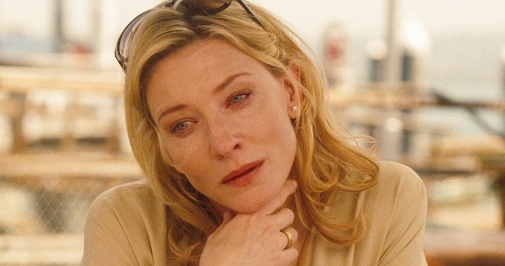
It's been ten years this week since Blue Jasmine arrived in theaters, kickstarting one of the most unwavering award sweeps in living memory. After a period where she dedicated most of her attention to the theater, Cate Blanchett returned to big screen leading lady status with Woody Allen's San Francisco-set Madoff-inspired spin on A Streetcar Named Desire. Her Jasmine is a modern Blanche Dubois bedecked in Chanel, a showcase for thespian pyrotechnics so immense nobody can be left indifferent. No wonder so many count the performance as Blanchett's best and one of the top Best Actress winners of the 21st century. I understand and even grasp the grandeur that enchanted Oscar voters, critics, cinephiles everywhere.
And yet, I can't deny a certain skepticism when faced with the achievement itself, finding it highlights many of the issues I often have with Blanchett on screen. Maybe I am a Blanchett agnostic…
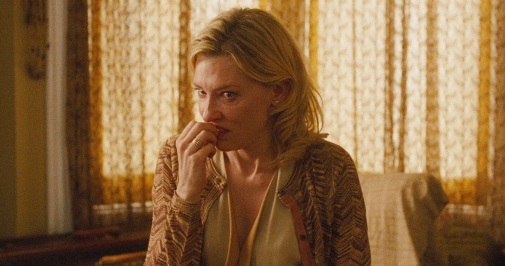
Woody Allen's Oscar-nominated original screenplay for Blue Jasmine is full of contradictions, often seeming uncertain of what it wants to say about its characters, social geography, and economic milieu. The very question of madness, so central to its theatrical heart, feels like an enigma with too many answers. Or, perchance to few, the auteur wavering between what's delusion and what's the fancifully-costumed truth of a dipsomaniac. For Blanchett made Blanche by another name, the issues compound to a mountainous height, jagged edges protruding all the way to the top.
Some actors would consider this challenge and then define their work as chisel and sandpaper, smoothing over the hard lines, the sharp projections, until it was all a polished object. Our Australian thespian, however, prefers to sharpen the mess rather than force the lie of evenness on what was never meant to be. She takes all the possible readings of Jasmine and plays them up to cacophonic effect, pulling in every direction with such dynamic brio you become distracted like a baby gazing at a mobile's spinning colors. This is acting as spectacle and excuse for itself - exhilarating to witness, less so to ponder.
It reframes the screen into a proscenium not that distant from the theatrical space of a performer's solo recitation. Blue Jasmine becomes a quasi-cynical acting exercise not just because Blanchett plays it accordingly but because Allen paved her path and pushed her along the winding ways.
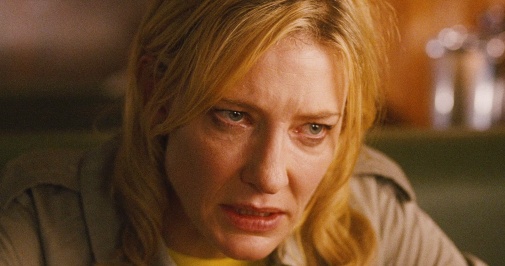
Entire sequences are built around flaunting the performance rather than going any deeper into the character, spitting in the face of psychological credulity or dramatic purpose to a point the entire endeavor rings with an echo of dishonesty. The camera doesn't regard Jasmine as subject. Instead, it considers Blanchett on that level. It sees her as an elemental phenomenon wholly divorced from the concepts and conceits the narrative feigns. A more experimental apparatus might have refashioned the project around that impulse, but Blue Jasmine insists on its Allen-branded zingers and some of the most superficial drama in the director's oeuvre, shackling itself to an unproductive model.
The 'tipping' spiel to her nephews is a particular bother and strikes me as the most evident point of failure in the project's zig-zagging priorities cum self-delusion. Allen and Blanchett appear so interested in relishing the disintegration of Jasmine that they seem unconcerned with what they have established about the broken woman. Specifically, I never believed the Jasmine on-screen as the same person whose backstory we are told and retold, a society hostess with an entire life built around projecting a curated image of wealth-facilitates superiority. At the moment we find her, the palace of projection has been bombed out of existence, but surely some of its foundations should still be visible.
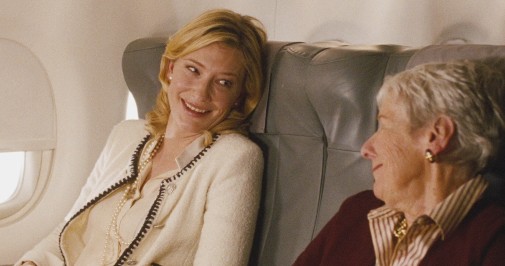
Surely, to define brokenness in characterization, the ghost of what was once whole must be reflected. When the flashbacks fail at this critical role, you know you're in trouble. Hell, going back to the beginning, to that opening airplane chit-chat, we find the characterization sweating with showboating neurosis before her reluctant companion's punchline. Everything is so demarcated as to be diffused out of its power. Similarly, the remembrance of a shoe-shop humiliating crowned with that iconic, Oscar-clip-ready roar feels pained in its strain to throw everything at the screen. These moments impress as individual elements. They're less persuasive when seen as part of a much larger edifice. But then I remember a flash of genius, the vacant stare upon the first outing with Hawkins or a cannibalizing loathing for everything and everyione - the mind reels.
To better appreciate Blanchett and Allen's Jasmine, I suppose missing the forest for the trees is ideal – and what amazing trees they are, endlessly entertaining evergreens.
Re-watching Blue Jasmine after all these years, cinematic opinions molded by new experiences, I hoped my negativity had assuaged. Sadly, that wasn't the case, making me very vexed at myself indeed. Reading this hot take express, you might think me a contrarian, but there's no pleasure in disagreeing on such a beloved actress's achievement. Still, revisiting Allen's movie in 2023, I do come to it with a much more expansive knowledge of Cate Blanchett as artist and star, how I tend to react to her. After experiencing her work in over fifty movies, I've concluded I'm oddly out of step with popular consensus on what constitutes her best performances, towering achievements, and well-worn strategies.
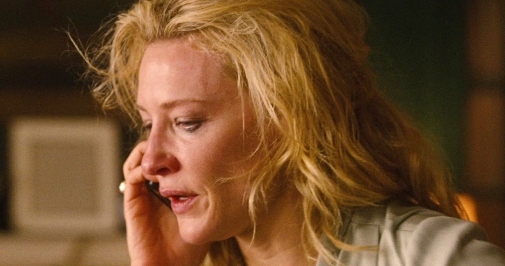
Performance-wise, the film's biggest problem might be how it amplifies all of Blanchett's most dubious instincts and justifies none of them. TÁR incurred similar skepticism from yours truly, and her Notes on a Scandal extravaganza still tastes overbaked, overegged, too much all around. Elizabeth is an old point of dissatisfaction, her '98 breakthrough feeling more mannered with each re-watch, a novice's eagerness to prove herself both in dialogue with the role and at odds with Kapur's directorial flourishes. Manifesto is another relative disappointment, no matter how elastic Blanchett's persona reveals itself.
Heaven may be lauded to the heights of its title, but it's not as incredible as its reputation promised, Giovanni Ribisi taking the MVP honors away from the leading lady from down under. Carol is a point of concordance, for not even I can deny its genius, partly because of how Blanchett calibrates her stage-bound instincts to a representation of period social theater. Then again, there's none of that in her final look at Rooney Mara's Therese, the lancinate vulnerability of her "I love you." The Talented Mr. Ripley's Meredith works in similar terms of purposeful artifice modulating spikes of honesty, so maybe it's a Highsmith-related phenomenon.
But that's too limiting a notion when one considers the marvel of her Truth, the euphoria of Bandits, or the sublimely stilted self-prison of Miss America, for which Blanchett should have won every award under the sun. From her Oscar-nominated turns, the biopic-adjacent stylings of Kate Hepburn and Bob Dylan delight by how they make a deviation from lived-in naturalism a point of strength rather than weakness, allowing brittleness to grow from fault to feature. They also use Blanchett's blinding star power in ways other projects seem afraid of exploring, selling her more as a chameleon than a bright spot in Hollywood's celestial firmament.
That said, I'd rather nominate Blanchett in 2004 for Coffee & Cigarettes, playing against herself in a naked acting exercise that never wears pretensions of something bigger, digging its heels in a state of playfulness. Oh, Blanchett is so amazing when she's playful, reveling in the fun of a role and inviting the audience to join on the ride to joy. I think back to her florid villainy in Hanna and Indiana Jones, the humanity laced within the diva devilishness of Cinderella's stepmother, the juicy exaggeration of Nightmare Alley and the monkey madness of Pinocchio. There's a clue of that quality in the genre etherealness of her Galadriel, perhaps in the color of Oscar & Lucinda and The Shipping News' trashy tramp too.
In The Man Who Cried, she's up to different wizardry, a magic circus in showgirl apparel. She reshapes the script around a hyper-fake demeanor and even faker accent, insinuating new meanings into the story while challenging every creative decision thrown by director Sally Potter. When working for Wes Anderson, she showed the same impulse, honing on the melancholy within the material and bringing it out, illuminating the potential paradoxes. So maybe I'm not a Cate Blanchett agnostic, just a believer who follows a different doctrine than the ruling dogma. My Holy Text comprises outliers instead of the most applauded stuff, prayers directed at Meredith Logue, not Jasmine-Jeanette nor Lydia-Linda. I believe Blanchett is often remarkable, though she needs projects where she fits as a collaborator, not just a showcased attraction.
Even so, all this rumbling babble aside, it's impossible to be mad at Blanchett's 2013 victory. Just remembering her smashing speech, a smile sketches itself on my face – "Thank you(…)to the audiences who went to see it, and perhaps those of us in the industry who are still foolishly clinging to the idea that female films with women at the center are niche experiences. They are not. Audiences want to see them, and, in fact, they earn money. So... The world is round, people!" – Amen.
Are you readying your torches and pitchforks to come for this Blue Jasmine heretic, or will you join me in Cate Blanchett sectarianism?